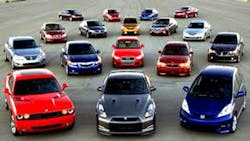TOKYO -- Japan's three biggest automakers -- Toyota (IW 1000/8), Nissan IW100/26) and Honda (IW 1000/30) -- on Monday posted record sales for 2012, as the results confirmed that Toyota recaptured the world's biggest automaker crown.
The rosy results underscored the trio's recovery after Japan's quake-tsunami disaster in 2011 devastated sales and production, and highlighted strong demand in the key Asian and U.S. markets.
That helped offset weakness in debt-hit Europe and a downturn in China stemming from a diplomatic row that sparked a consumer boycott of Japanese goods in China, the world's biggest vehicle market.
On Monday, Toyota said sales last year soared 22.6% to 9.75 million vehicles, while Nissan saw a 5.8% on-year rise to 4.94 million units with record numbers in the U.S. market.
Honda, Japan's number-three automaker, logged sales of 3.81 million vehicles, up from 3.09 million a year earlier.
The latest figures confirmed that Toyota regained the global sales title which it lost in 2011 to General Motors, largely due to the natural disasters.
The crisis and flooding in Thailand -- where Japanese automakers have production plants -- during 2011 marked a "particularly harsh year," said Nomura auto analyst Masataka Kunugimoto.
"2012 is the year we saw things becoming normal again," he said.
Issues Affecting Production
However, Nissan, part-owned by France's Renault, warned in November that its net profit for the fiscal year through March would be down 20% to 320 billion yen (US$3.52 billion), citing its heavy exposure to China.
Honda has blamed the territorial row with Beijing over an East China Sea island chain -- and a strong yen -- for a 20% cut to its annual profit forecast.
Less affected by the dispute, Toyota hiked its profit forecast to 780 billion yen for the same period, up from 760 billion yen, although it trimmed its annual sales forecast to 21.3 trillion yen and credited much of its improved earnings outlook to cost cuts.
The long-standing row flared again in September when Tokyo nationalized some of the tiny archipelago that is also claimed by Beijing, setting off huge demonstrations across China and the consumer boycott.
Japanese factories and businesses across China temporarily closed or scaled back operations over fears of being targeted by angry mobs.
Nissan's chief executive Carlos Ghosn has warned that the firm would think twice about making new investments in China, where it has several production plants with a new factory in the northeastern city of Dalian planned for 2014.
On the production side, Toyota said Monday that it made 9.90 million vehicles last year, up 26.1%, while Nissan posted a 5.5% production increase to 4.88 million units in 2012.
The automakers have been forced to recall millions of vehicles over safety and quality concerns in recent years, while being hit by the strong yen which makes their products less competitive overseas and shrinks repatriated foreign income.
The unit hit record highs around 75 against the dollar in late 2011 and remained strong through most of last year until Japan's new conservative government swept to power in December.
Its promises to pressure the Bank of Japan for aggressive easing to boost the world's third-largest economy has sent the yen into a steep dive to below the 90-level on the dollar. "Foreign exchange remains the major factor that can change the tone of the industry," Nomura's Kunugimoto said.
"A lower yen is positive for earnings. If that continues, it would allow for more research and development spending which should then strengthen automakers' competitiveness."
- Hiroshi Hiyama , AFP
Copyright Agence France-Presse, 2013
About the Author
Agence France-Presse
Copyright Agence France-Presse, 2002-2025. AFP text, photos, graphics and logos shall not be reproduced, published, broadcast, rewritten for broadcast or publication or redistributed directly or indirectly in any medium. AFP shall not be held liable for any delays, inaccuracies, errors or omissions in any AFP content, or for any actions taken in consequence.
